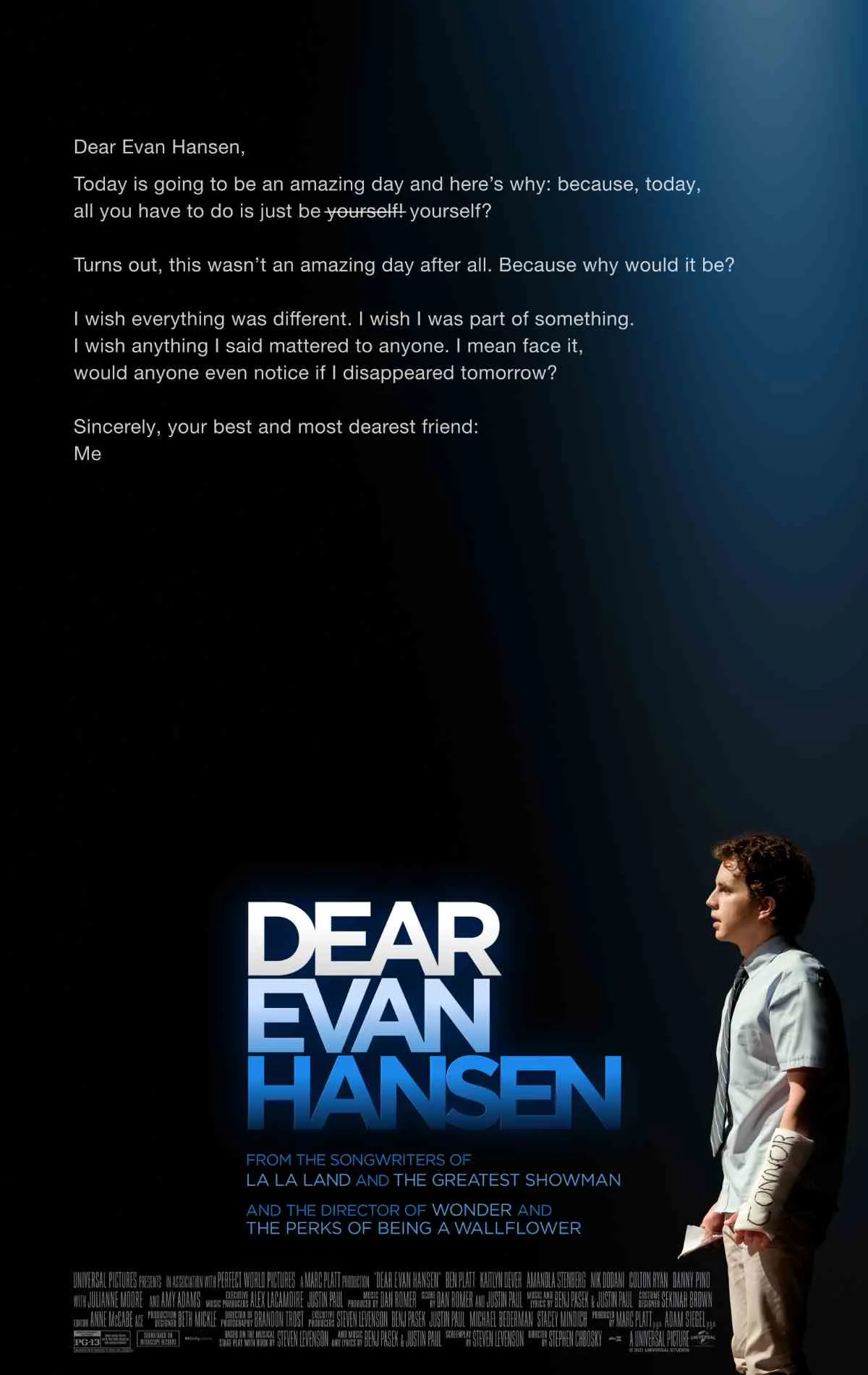A musical, particularly a musical with strong upbeat numbers from the team behind The Greatest Showman and La La Land, built around teen depression and suicide, is a mighty big swing. It’s such a delicate topic it’s going to land differently for everyone, and musical drama is a genre that, at best, favors big melodrama that reaches the back rows.
Combined with big studio filmmaking, the result is something designed to be as reductive as possible and, unless you’re Stephen Sondheim, ending on as bright a note as possible. These are not wildly disparate requirements, but trying to capture all of them is a bit like capturing lightning in a bottle. The best outcome is more likely to be ‘okay’ than anything else. Dear Evan Hansen is mostly okay.

Evan Hansen himself is not okay, and he would be the first one to tell you that if he could bring himself to tell you anything. Nearly immobilized by anxiety, Evan spends most of his time in his own head trying to deal with the reality of the world, including continued pain from his parents’ divorce and the lack of connection with any of his family.
The only person who might understand his sense of isolation and offer some solace is equally troubled Connor, but that comes to nothing when Connor’s demons lead him to suicide. A note found on Connor links him to Evan, drawing Evan into Connor’s family as they seek some sort of solace and understanding, and Evan feeds on the connection even if that means keeping the misunderstanding going.

Like all lies, the small roots quickly grow into large trees, and this one threatens to topple over at the slightest breeze.
On the one hand, you might question, ‘Why make a musical out of such a heavy subject’? On the other hand, that is, in theory, what art is here for, and juxtaposing forms can offer real insight that a traditional approach might not. That’s more ambitious than Dear Evan Hansen is, no matter what the concept sounds like, but it is here, so all we can do is take it for what it is.

And what it is is a decently constructed studio musical (and a Broadway musical before that), which means it wants and needs to reduce any emotional moment to an easily digestible song that can fit within an easily digestible three minutes. This sort of thing does not lend itself to complex emotional investigation; it lends itself to easily manipulated emotional bromides and upbeat conclusions. And that’s okay.
That’s in part because they are really good musical bromides. Benj Pasek and Justin Paul are really good at crafting ear-wormy numbers, which easily exist without any sort of human truth or even meaning. The Greatest Showman was basically built on that concept, and it worked perfectly fine there.

It’s a bit more manipulative in Evan Hansen, with the numbers trying to focus on the lived reality of pain and loneliness while still being extremely catchy. It’s a dichotomy that mostly works, which isn’t that strange considering that good songs explicitly conceptualize emotions in a way spoken dialogue doesn’t and, in a story where the characters specifically aren’t able to do that.
It has no great conclusions to make about what that reality means for the people going through it beyond ‘try hard not to get lost too far inside yourself’, but it exists just fine without that.

A lot of that comes down to the cast, as the nature of the material keeps director Stephen Chbosky anchored to something like a real world and unable to utilize the pageantry or movement musicals normally have access to.
The success of the songs and what they say about the world (and they are generally the only thing saying anything about the world) is left entirely to the performers, who mostly must work solo as they focus on their own internal issues.

That means most of it is left to Evan himself, performed by Ben Platt, who originated the role on Broadway way back in 2015. On paper, he’s a bit too old to be still attempting a high school role, but being a musical, his age is in his voice, and when Platt sings, he is very much the awkward young man he needs to be, especially in the instances he spends around Kaitlyn Dever and Amandla Stenberg who do more than anyone else to add reality to what is ultimately a mannered Broadway musical.
Dear Evan Hansen is not a complex investigation into mental health, teen suicide, and how those affect families and communities. It’s not ever tried to be, even if it has cloaked itself in its appearance. It’s a musical aiming at temporary euphoria and an easily quantified conclusion. That certainly puts a cap on how good it could be, but Evan Hansen isn’t trying to be great, just okay and it succeeds perfectly well at that.
DEAR EVAN HANSEN REVIEW SCORE: 6.5/10


Joshua Starnes has been writing about film and the entertainment industry since 2004 and served as the President of the Houston Film Critics Society from 2012 to 2019. In 2015, he became a co-owner/publisher of Red 5 Comics and, in 2018, wrote the series “Kulipari: Dreamwalker” for Netflix. In between, he continues his lifelong quest to find THE perfect tomato soup and grilled cheese sandwich combination.